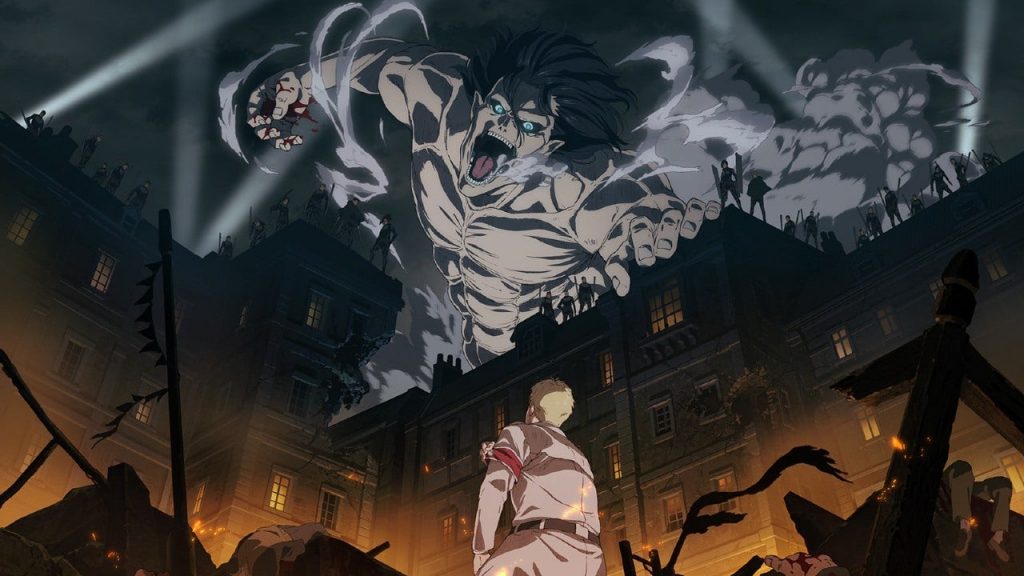“You can’t change anything unless you can discard part of yourself too. To surpass monsters, you must be willing to abandon your humanity.” – Armin Arlert.
With rumors of confirmation of the last ever part of the widely critiqued and massively popular Shingeki no Kyojin (Attack on Titan), perhaps the entirety of the worldwide anime society is on their toes waiting for the plot to unveil. And for anime-onlies such as myself, life has become a constant struggle for avoiding manga spoilers, lying about watching the anime, and waiting in suspense for the final few episodes.
Attack on Titan, widely known for its complex double-edged and realistic portrayal of nationalism, as well as its extremely dark premise, sticks true to its standards even in Part I of Season 4. However, for the first time, they come out of the age-old still picture anime characterization that they’ve done for so many years and appoint an animation agency MAPPA. The effects of it are not unnoticed. The characters are sharper and seem more horrific, perfectly fitting the anime’s gore premises. The characterizations of MAPPA are more fitting to their roles (Mikasa being a tall girl with short army-cut hair). The titan movements and action sequences feel a lot smoother than they were before. However, that is not to say that the artists of the previous seasons had any shortcomings; they were all individually efficient in their own rights.
Season 4 has our favorite Eren party interacting with the people beyond the walls for the very first time. The party has come a long way, from first only learning that there exists something worth exploring beyond the walls to witnessing the sea, and now building their own port, making foreign allies, and leading expeditions beyond the ocean. However, Attack on Titan is nothing if it does not make you raise challenging questions about your beliefs. In the first few episodes, the anime starts by creating parallels between Paradis and Marley. The last three seasons made us hate the Marleyans from the cores of our hearts. Season 4 portrays them as any other nation in fear of an uprising from their minorities (Eldians). It portrays instances of how the Eldians destroyed Marleyan homes and raped their women and children before. The final nail in the coffin, with regards to the character of the Eldians, is Eren’s successful movement against Marley, destroying literally everything.
The only truth is that Eldians and Marleyans are sworn enemies because of ideological reasons, the same way how certain states are just enemies.
An essential new character in our story is Gabi. She could be called a parallel to Eren.
She is brainwashed with a sense of nationalism. She is unwilling to consider or even think about actions and their consequences or the causes of everything. She only accepts the interpretation of history that glorifies Marley, the version that her family has taught her from childhood. We could hate Gabi all we want, but in Gabi, I saw every single one of us, fed with a false sense of elitism defined by our state boundaries, questioning everything apart from the incentives of our political or religious systems. The parallel, however, is not very strong. The character of Gabi or that of the honorary Marleyans is given little effort into building up. Therefore, Gabi and other Eldian empathizers still feel hateful to some extent, instead of embodying the exact persona of the Eldians from Paradis island. An entire other season just to develop the character of the Marleyans could have been something necessary that the creators of the anime missed.
Meanwhile, Eren Yeager faces distrust in his own homeland. Remember the careless and hot-headed kid at scout camp, who had zero brains and just a loud voice? What happens when such a kid grows up with all forms of support from around? He turns into a fundamentalist leader. We have seen too many such instances in history already, haven’t we?
Eren loses the trust of his comrades due to his extreme ideals and reckless behavior. But fundamentalist leaders always have a backing, as supremacy is the default thought process. We see the same, as the entire brass of Paradis is divided into two factions, one for diplomacy and the other blinded by the thought of a supreme cause promised by their iconoclast leader. The series further has people on their toes as another character Zeke is first seen fighting beside Marley and then seen as a captive of Paradis. While Zeke could primarily be perceived as just another attention-hogging Eldian, Zeke’s story connects many cliffhangers from the earlier seasons. It opens up the viewer to lots of hidden secrets. Zeke is found to be a more complex character than he was shown to be. He has an intricate plan, and he seems to be succeeding with his half-brother Eren Yeager by his side.
Reiner on the other hand faces a harsh dilemma. A scout that joined the Marleyan army out of a self-built mission to clear the name of Eldians as devils, now is faced with deep regret for the atrocities he carried out at Paradis. He questions the incentives of the war. He keeps loyal to the country he serves, but also resonates a part of our human nature: keeping loyal to our communities never wondering what makes the beliefs of it so sacred.
The anime still manages to hold the attention of the audience and engage the viewers into the anger, hatred, and passion of each of the warriors. This season definitely will keep you engaged until the very end.
